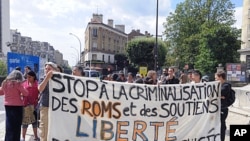Human Rights Watch says police in France are singling out ethnic Arab and African youths for unwarranted and sometimes humiliating identity checks. The rights group says this apparent ethnic profiling is further exacerbating an already tense relationship between authorities and minority youths.
A young man who recounted being stopped and questioned by French police thinks it's because he's Arab. One identity check is OK, he says. But after a second, third and fourth, he says it's like being in a giant prison.
His account is among dozens gathered by Human Rights Watch in interviews with minority youths in the cities of Paris, Lyon and Lille. In a new report, the rights group says ethnic Africans and Arabs - some as young as 13 years old - are often targeted in police checks, even though they do not appear to be doing anything wrong. Another study, in 2009, found that French police were far more likely to stop blacks and Arabs than white people.
"When they are stopped by the police, they are far more likely to be searched, frisked in a very invasive and often humiliating way for no justifiable suspicion," noted Judith Sunderland, senior Western European researcher at Human Rights Watch. "They are more likely to be subject to lengthy interrogations about what they're doing, where they've been going, where they've been and sometimes these identity checks are accompanied by insults and even physical abuse."
Many of these youngsters live in France's gritty "banlieus," or suburbs -- known for their high immigrant populations and soaring unemployment and crime. In 2005, the suburbs exploded into riots after the deaths of two youths who had been chased by police.
"These are kids and young adults who are French, who feel very French. They identify as French, but nonetheless feel targeted by the police because of how they look," she explained. "Because of who they are, because of where they live."
Just weeks before French presidential elections, crime and immigration are top voter concerns. French President Nicolas Sarkozy came to power partly on his law-and-order image. Cracking down on crime and immigration is also the message of far-right candidate Marine Le Pen, who is scoring well in the polls.
Human Rights Watch is calling for tougher and clearer rules for police checks. Sunderland says the rights group has met with French authorities. They are aware there is a problem, she says, and they are willing to consider solutions.
New Report Accuses French Police of Discrimination
